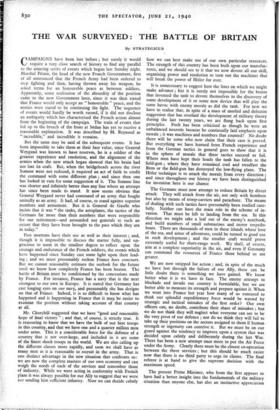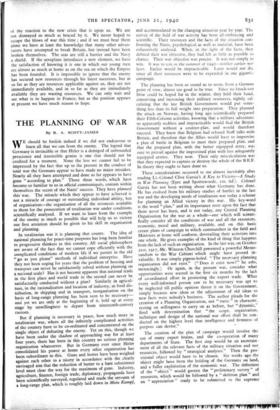THE WAR SURVEYED : THE BATTLE OF BRITAIN
By STRATEGICUS
CAMPAIGNS have been lost before ; but surely it would require a very close search of history to find any parallel to the amazing series of events which began last Sunday night. Marshal Petain, the head of the new French Government, first of all announced that the French Army had been ordered to stop fighting and then, having thrown away his weapon, he asked terms for an honourable peace as between soldiers. Apparently, some realisation of the absurdity of the position came to the new Government later, since it was then stated that France would only accept an " honourable " peace, and the armies were stated to be continuing the fight. The sequence of events would hardly be worth record, if it did not disclose an ambiguity which has characterised the French action almost from the beginning of the campaign. The train of events that led up to the breach of the front at Sedan has yet to receive a reasonable explanation. It was described by M. Reynaud as " incredible," and incredible it remains.
But the same may be said of the subsequent events. It has been impossible to take them at their face value, since General Weygand was known to have reserves, he is a soldier of the greatest experience and resolution, and the alignment of the armies when the new attack began showed that his brain had not lost its craft. But, when the bridgeheads across the river Somme were not reduced, it required an act of faith to credit the command with some different plan ; and since then one has looked in vain for some suggestion of it. The Somme line was shorter and infinitely better than any line where an attempt has since been made to stand. It now seems obvious that General Weygand never had command of an army that fought unitedly as an army. It had, of course, to stand against superior numbers and armament. But it is General de Gaulle who insists that it was " the tanks, the aeroplanes, the tactics of the Germans far more than their numbers that were responsible for our retirement—and astounded our generals to such an extent that they have been brought to the pass which they are in today."
Post mortems have their use as well as their interest ; and, though it is impossible to discuss the matter fully, and un- gracious to seem in the smallest degree to reflect upon the courage and endurance of the French soldiers, the events which have happened since Sunday cast some light upon their lead- ing ; and we must presumably reckon France hors contours. But we cannot reasonably estimate the outlook for the future until we know how completely France has been beaten.
battle of Britain must be conditioned by the concessions made by France. For instance, France has a navy that is the next strongest to our own in Europe. It is stated that Germany has cast longing eyes on our navy, and presumably she has designs on that of France. Indeed, it is so difficult to know what has happened and is happening in France that it may. be easier to examine the position without taking account of that country at all.
Mr. Churchill suggested that we have "good and reasonable hope of final victory " ; and that, of course, is strictly true. It is reassuring to know that we have the bulk of our best troops in this country, and that we have one and a quarter million men under arms. This is a considerable force for the defence of a country that is not over-large, and included in it are some of the finest shock troops in the world. We are also calling up the different classes more rapidly, and soon we shall have as many men as it is reasonable to recruit in the army. That is one distinct advantage in the new situation that confronts us: we are now the complete masters of our own economy and can weigh the needs of each of the services and remember those of industry. While we were acting in conformity with French plans it was always possible for our Ally to suggest that we were not sending him sufficient infantry. Now we can decide calmly how we can best make use of our own particular resources. The strength of this country has been built upon our manufac- tures, and we should see to it that we now devote all our skill, organising power and resolution to turn out the machines that will break the power of Hitler for ever.
It is unnecessary to suggest here the lines on which we might make advance ; but it is surely not impossible for the brains that invented the tank to devote themselves to the discovery of some development of it or some new device that will play the same havoc with enemy morale as did the tank. For now we have to realise that, in spite of a mass of morbid and defeatist suggestion that has overlaid the development of military theory during the last twenty years, we are flung back upon first principles. Foch has been criticised as though he were an unbalanced neurotic because he continually laid emphasis upon morale ; it was machines and numbers that counted! No doubt there will be some who now claim that their case is proved. But everything we have learned from French experience and from the German tactics in general goes to show that it is in the sphere of morale that these tactics succeed or fail. Where men have kept their heads the tank has fallen to the field-gun ; where they have remained cool and steadfast the Bren or the field-gun has destroyed the low-flying plane. The Hitler technique is to attack the morale from every direction ; and since throughout our history we have been distinguished for invention here is our chance.
The Germans must now attempt to reduce Britain by direct attack. They will attack from the air, not only with bombers but also by means of troop-carriers and parachute. The means of dealing with such tactics have presumably been studied care- fully. Neither can have the main role in the scheme of in- vasion. That must be left to landing from the sea. In this direction we might take a leaf out of the enemy's notebook, and build numbers of small submarines and motor torpedo- boats. There are thousands of men in these islands whose love of the sea, and sense of adventure, could be turned to good use in such development ; and the smaller craft would prove extremely useful for short-range work. We shall, of course, aim at a complete superiority in the air, and even if Germany can command the resources of France those behind us are greater.
We are now stripped for action ; and, in spite of the much we have lost through the failure of our Ally, there can be little doubt there is something we have gained. We know better what it is we have to face. The enemy attempt to blockade and invade our country is formidable, but we are better able to measure its strength and prepare against it. When we went into France last year how many of us ventured to think our splendid expeditionary force would be wasted by strategic and tactical mistakes of the first order? Our own officers can, no doubt, contribute their share of mistakes ; but we do not think they will neglect what everyone can see to be the very pivot of our defence ; nor do we think they will fail to take up their positions on the sectors assigned to them if human strength or ingenuity can contrive it. But we must be on our guard against the tendency to improve upon a system that was decided upon calmly and deliberately during the last War. There has been a new attempt once more to put the Air Force under the Army. Clearly there must be the closest co-operation between the three services ; but this should be much easier now that there is no third party to urge its claims. The final referee is at hand to give the supreme decision with the maximum speed.
The present Prime Minister, who from the first appears to have had a better insight into the fundamentals of the military situation than anyone else, has also an instinctive appreciation of the reaction to the new crisis that is upon us. We are not dismayed so much as braced by it. We never hoped to escape the blows of war this time ; and if we must bear them alone we have at least the knowledge that many other adven- turers have attempted to break Britain, but instead have been broken themselves. The seas are still a barrier and the Navy a shield. If the aeroplane introduces a new element, we have the satisfaction of knowing it is one in which our young men are almost as much at home as on the sea on which the Empire has been founded. It is impossible to ignore that the enemy has secured new resources through his latest successes, but in so far as they are resources applicable against us, they are not immediately available, and in so far as they are immediately available they are wasting resources. We can only wait and see what is to happen in France; but as the position appears at present we have much reason to hope.































 Previous page
Previous page